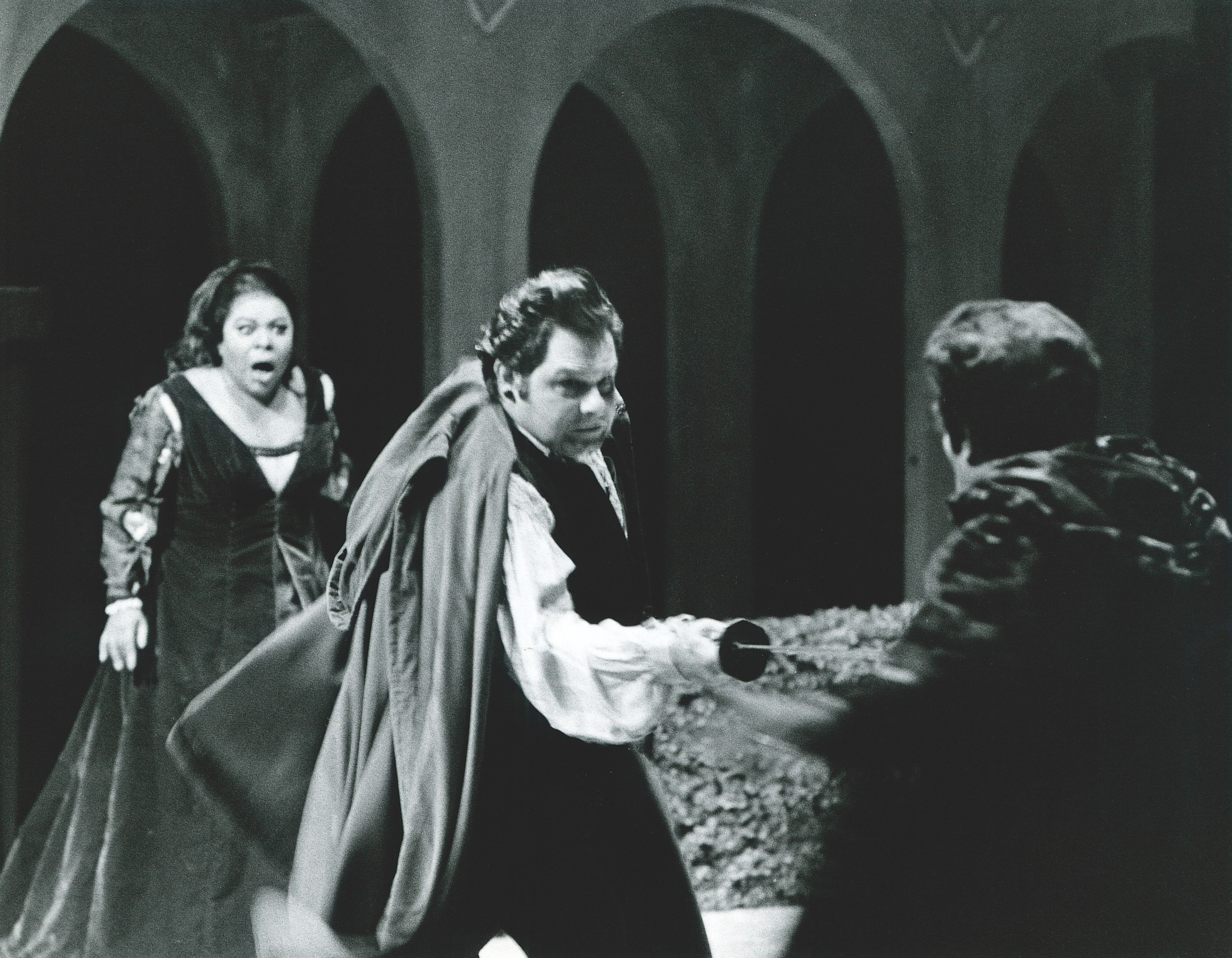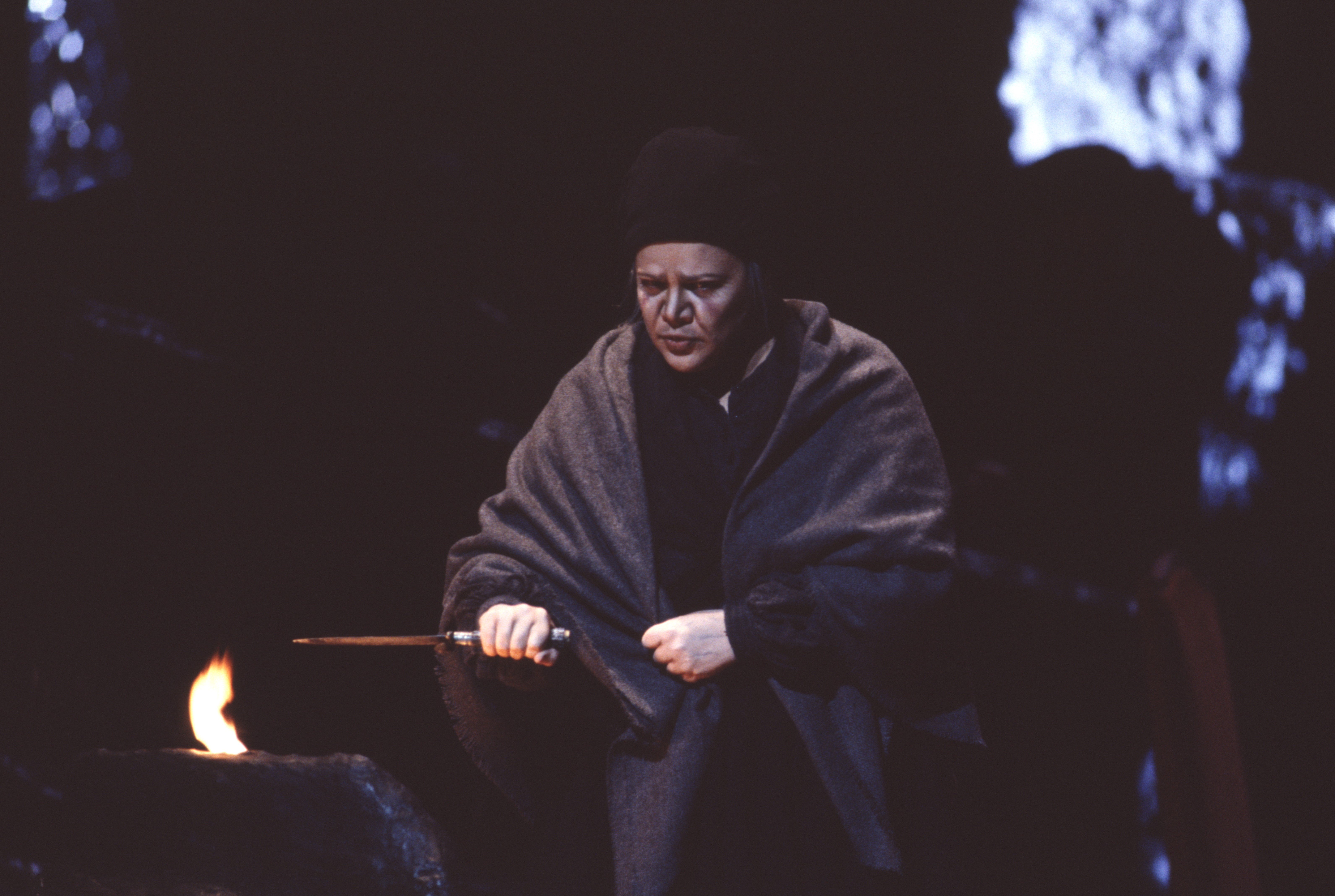The End of HGO’s Trovatore Curse?
If any composer’s works were cursed, it would have to be Verdi’s. He gravitated toward gothic tales of fate and vengeance, and his characters always seem to be pronouncing maledictions on one another.
Now, we here at Houston Grand Opera aren’t exactly reaching for the holy water just yet. But it’s hard not to notice a suspicious pattern of odd goings-on surrounding one repertoire warhorse in particular. Dark forces always seem to make mischief whenever HGO mounts Verdi’s Il trovatore—something the Houston Chronicle took note of back in 2005.
The work has been plagued by a string of mishaps and mild mayhem over the company’s near-70-year history. This season’s production, newly directed by Stephen Wadsworth, will be the seventh. It’s a lucky number that could hopefully break what the HGO staff has half-jokingly dubbed the “Trovatore curse.”
It all seems to have begun with the 1974 production. Superstar soprano Martina Arroyo threw out her back and had to be replaced after a single night as Leonora. The casting nightmares only got worse as the years progressed.

In 1980, the Russian baritone playing Count di Luna couldn’t secure a visa. Bulgarian soprano Raina Kabaivanska also pulled out last minute. Renata Scotto herself stepped in as Leonora but quit during rehearsals due to “irreconcilable artistic differences” with director Giancarlo del Monaco. The fiasco was finally settled when Lou Ann Wyckoff flew in from Berlin to fill the role.
The curse mercifully spared the 1992 cast from illness and injury. But the show wasn’t left completely untouched. During one performance, Vyacheslav Polozov as Manrico missed an entrance and conductor Rico Saccani had to “ventriloquize” for him from the pit.
In 2005, the Chronicle piece reported that HGO was seeking to break the curse, yet it returned with a vengeance. This time, it struck on the slopes—mezzo-soprano Dolora Zajick, who was supposed to reprise her 1992 role as Azucena, suffered a skiing accident a few weeks before opening night. This set off a complicated game of operatic musical chairs. Fighting a head cold and vocal fatigue, Jill Grove sang as many performances as she could, but two additional mezzos had to cover for her on a few evenings. In all, including the understudy, five Azucenas were contracted that year.
The curse even claimed an audience member as its victim during that run. One night, Sondra Radvanovsky took the stage for Leonora’s Act IV aria “D’amor sull’ali rosee.” As the orchestra intoned its quiet introduction—an eerie woodwind theme—an ear-piercing scream was suddenly heard from the balconies.
“Somebody upstairs must have gone out to go to the bathroom and come back,” recalls HGO Artistic and Music Director Patrick Summers, who was conducting. “And she fell where the stairs are really steep—I think she broke something. Sondra was petrified, because the woman really screamed loud.” (To be sure, this season’s ticketholders shouldn’t have any reason to fear navigating the aisles, provided they’re in their seats by the end of intermission and take ahold of the handrails…)
Fittingly, curses figure in quite a few of Verdi’s operas. The titular jester in Rigoletto is cursed after mocking a courtier, whose venomous words ring in Rigoletto’s head until the tragic finale. Verdi and his librettist even considered titling the opera La maledizione—“The Curse.”
In La forza del destino, the Marchese curses his daughter with his final breath after he’s accidentally shot by her lover. The opera itself has long been considered cursed. Pavarotti would allegedly grab his…well…testicoli if he heard even the name of the opera uttered—a gesture meant to ward off the evil eye.
And then of course there’s Verdi’s adaptation of Macbeth—or, as Summers refers to it to avoid saying its title aloud, “the Scottish opera.” The superstitions of spoken theater surrounding the original play have also extended to the opera world. Summers recounts a dreadful occurrence at a Metropolitan Opera performance of Macbeth in 1988 when Bantcho Bantchevsky—a Bulgarian baritone and vocal coach—committed suicide during intermission, falling backward from the balcony.
“Trovatore isn’t based on Shakespeare,” Summers observes, “but it’s conceived in a very dark, Shakespearean way.” Based on a drama by the Spanish playwright Antonio García Gutiérrez, the opera is propelled by a revenge curse that Azucena, a Romani woman, is tasked with carrying out.

According to the opera’s backstory, Azucena’s mother was falsely accused of sorcery and sentenced to death by Count di Luna. Set ablaze on the pyre, Azucena’s mother shrieked for her daughter to avenge her. At once, Azucena kidnapped the Count’s infant son and threw the baby onto the same fire that consumed her mother. But to her horror, Azucena realized that it was her own child she had inadvertently immolated. The strains of her aria “Stride la vampa”—in which Azucena recounts these horrible events—repeat throughout the opera as a musical reminder that she still owes her mother’s spirit a debt of retribution.
The impossible plot of Il trovatore has been a target of parody since its 1853 premiere. But for Verdi, such unlikely events didn’t lie outside the realm of possibility. In fact, the composer had unleashed a curse of his own and witnessed its fiery fulfillment. When he was seven years old, Verdi was serving as an altar boy. Distracted by the liturgical music, he momentarily neglected his duties and was punished by the priest, who kicked him down the altar steps. “May God strike you with lighting!” cried the young Verdi. Seven years later, the priest was killed when lightning struck a church. Surveying the wreckage, a now teenaged Verdi laid eyes on the charred remains of the clergyman—a gruesome sight that recalls the half-burnt baby skeleton described in Il trovatore.
So what’s the cause of HGO’s Trovatore curse? Is there some phantom lurking in the shadows of the Wortham Center with a bone to pick? (Or maybe he just doesn’t like Verdi very much…) Summers’s explanation is less supernatural than practical. “I think it’s just a very hard opera. All operas are difficult. But Trovatore is particularly challenging.”
Indeed, Enrico Caruso famously quipped that to perform the opera, all that’s needed are the four best singers in the world. But Summers seems to have found a means of breaking the curse by one-upping Caruso’s dictum: “This one feels very, very different. We really have hired five of the greatest singers in the world.”
In addition to the central quartet—soprano Ailyn Pérez as Leonora, mezzo-soprano Raehann Bryce-Davis as Azucena, baritenor Michael Spyres as Manrico, and baritone Lucas Meachem as Count di Luna—Summers includes bass Morris Robinson as the Count’s henchman, Ferrando. The character’s Act I ballad, “Di due figli,” is a crucial number that introduces the curse and sets the opera’s spooky mood.
Perhaps it’s simply sheer talent rather than spells, exorcisms, or rabbits’ feet that can reverse this curse. When pressed to comment more, however, Summers is understandably reticent: “I don't want to jinx it.”